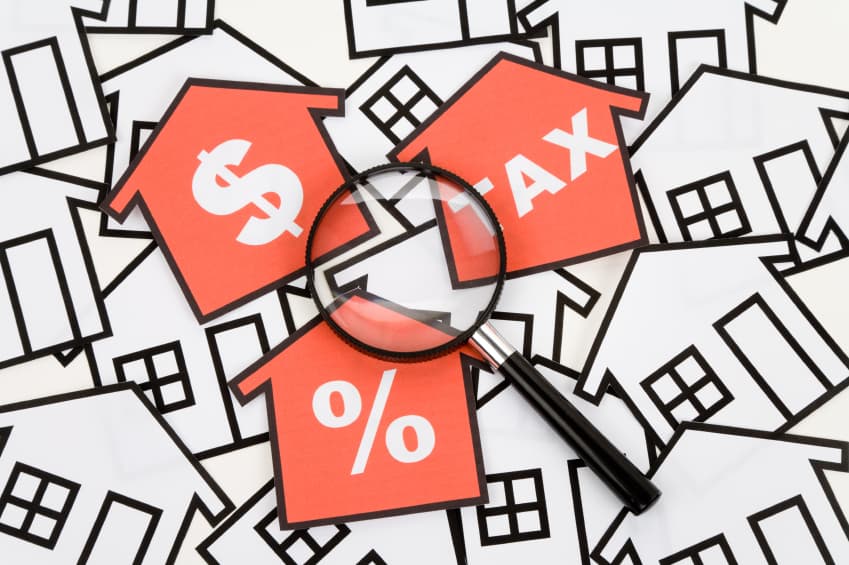
Knowing how your property taxes work, what causes them to go up and down and what exemptions are available is important – and that knowledge can even save you money.
Property taxes are generally levied by county, but often include taxes paid to other local entities like school districts, utility authorities or city governments. The rules, rates and regulations surrounding property taxes can vary significantly depending on where you live. Therefore, these guidelines are general – for specifics, please consult your taxing authority.
How are property taxes levied? Generally speaking, your home is assessed by a county property assessor, who assigns your home a certain value. Then your local taxing authority sets the rate at which your home will be taxed, which is called a multiplier. So, for example, if your home is assessed at $100,000 and the tax rate is set at 2.4 percent, each year you would need to pay $2,400 to your local taxing authority.
It is a simple concept, but it gets complicated. The tax rate, for example, involves the budgets and political wrangling of your local government entities – and this is as messy as it sounds.
And then there’s the assessed value of your home. Depending on your area, the assessed amount can be wildly inconsistent with how much you would make if you sold your home. For example, in Chicago’s Cook County (where I’m an agent), a property’s assessed value is 10 percent of its estimated value – and its estimated value is often tens of thousands of dollars off, in part because properties are only assessed every three years.
So, in Chicago, for example, if a condo recently sold for $350,000, its estimated value may be $310,000, making its assessed value $31,000. This amount would be multiplied by this year’s state-mandated equalization factor of 2.6621 (I told you this gets hairy once you drill down to specifics), and that product would be multiplied by the current Cook County multiplier of 6.832 percent, to get the amount owed for this year: $5,638.11.
But, as you probably know, the amount you owe changes each year. This is due in part to changes in the tax rates – and in part due to changes in the assessed value of your home. And it’s the latter where you can make a big difference.
So, if you learn nothing else about property taxes, these are the big takeaways:
Make Sure You Take All the Exemptions Available to You.
Most jurisdictions provide a discounted tax bill for individuals in certain circumstances. This is called an exemption. Here are the most common exemptions, though be sure to check with your local taxing authority for others that may be available.
- Homeowner (or Homestead) Exemption. If you actually live in your home (as opposed to using it as an investment property or a vacation home), you almost always get a tax break – often a significant one.
- Senior Citizen Exemption. Much like it sounds, in many jurisdictions senior citizens receive special tax treatment. Occasionally, disabled citizens unable to work are eligible for a similar exemption.
- Home Improvement Exemption. If you make significant improvements to your home, the increased value of your home can often be exempt from your assessment, at least temporarily. Usually the increased value of your home is phased into the assessment over several years, so that your property taxes don’t jump all at once – over the term of the exemption, you can save thousands of dollars in taxes.
- Veteran Exemption. Many jurisdictions have exemptions for veterans or spouses of deceased veterans. Additionally, the Disabled Veterans’ Exemption is available in most jurisdictions and often waives your entire property tax bill.
What type of home loan is right for you?
Discover your loan options and secure the right mortgage to fit your needs.
When and How is Your Property Assessed?
What type of home loan is right for you?
This can affect how much property tax you pay and how you consider an upcoming real estate transaction. Let’s look at three examples:
- In Cook County, Illinois, property values are assessed once every three years, regardless of whether there’s a transaction on the property. When you buy a place, you may have the same assessed value for two more years. Depending on the market, this could save or cost you some money.
- In Salt Lake County, Utah, property values are formally reviewed and assessed every five years, but the county annually looks at the sales prices for each neighborhood and adjusts its valuation for each home annually, to make sure it tracks with the market relatively closely.
- In California, by law, the assessed value of a property cannot increase by more than 2 percent per year, provided that the same owner keeps the property. But once the property sells, it can be assessed at the prevailing market rate the first year of new ownership. So, if you’re in San Francisco right now, where there’s a housing boom, and you buy a home that’s increased in value by 150 percent over the past five years, expect a much, much bigger tax bill than the previous owner. The good news is that if your home continues to appreciate, you won’t get buried by an ever-increasing tax bill.
As you can see, knowing when and how your property will be assessed is important – it will clue you into what you should expect to pay going forward.
You Can Appeal Your Property Value Assessment.
That said, just because you can, it doesn’t mean you should. If your assessment is roughly comparable to nearby properties of the same size and type, you’re unlikely to win an appeal. But, sometimes there is a significant discrepancy between your home’s assessed value and that of your neighbors – and it’s nice to know you have recourse if that’s the case.
Your Area May Have Property Tax Assessment Caps.
California is probably the most extreme example – as discussed before, the property value assessment cannot increase by more than 2 percent per year until the property changes hands. A few other states and localities have similar limits on the rate at which an assessment may go up, or have ‘circuit breaker’ limits that prevent owners from having to pay too large an increase in property taxes. While tax caps are very popular with voters, they’re controversial: Some policy researchers believe they do not achieve their goal of decreasing the amount of taxes a homeowner pays.
Regardless, for your purposes, it’s important to know whether there’s a cap in your area. If there is, it can affect you both when you first buy (the property’s taxes will likely skyrocket) and once you’ve owned for a while (your taxes will be largely stabilized).
Overall, the language surrounding property taxes can be filled with jargon and nuance. But don’t be intimidated. If you’re aware of a few basic principles and you do some research about your locality, you’ll understand how homes in your area are taxed – and what that means when buying and selling a home. You’ll also be sure to take all the exemptions available to you – and you’ll have a good sense of whether it’s appropriate for you to appeal your assessment.
And that’s about it. Congratulations on making it through a primer on property taxes!

About Ali Donoghue
Ali Donoghue is a Redfin real estate agent in Chicago. She’s an expert negotiator who loves educating her clients about all aspects of the real estate process. In 2013, she was named a Top 1% Producer by the Chicago Association of Realtors. While she’s studied in London and speaks Italian, Donoghue is a lifelong Chicagoan who has enjoyed watching the Windy City’s neighborhoods transform over the years.


























 United States
United States Canada
Canada